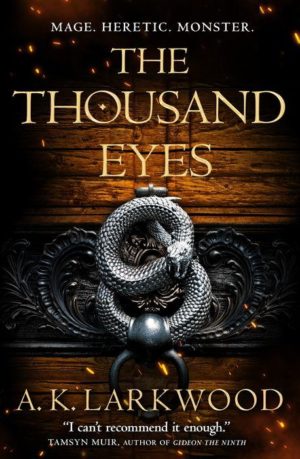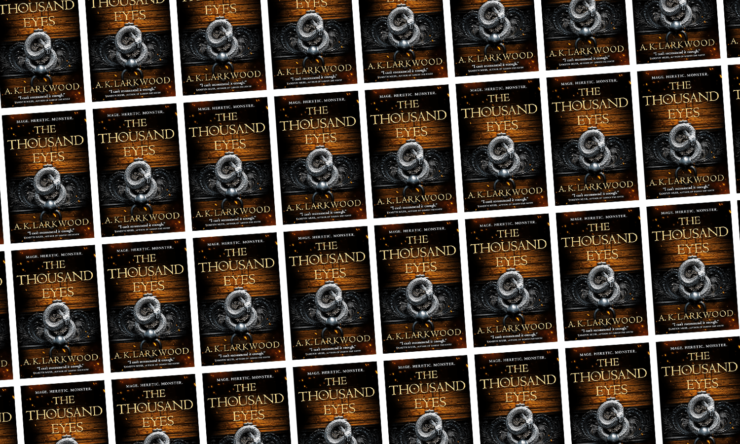It’s a bold move to take the 20-something protagonists of your first epic fantasy novel and, after the first act in your second book, thrust them twenty years into the future. But A. K. Larkwood is nothing if not bold, and The Thousand Eyes, the second and final installment of The Serpent Gates duology, swings for the fences and ends up somewhere in another dimension, surrounded by giant snakes, with three gods cannibalizing each other. It’s bonkers. And if you loved Csorwe, Shuthmilli, and Talasseres before (and I did, very much so), you will only love them more when they are nearer middle-aged, jaded, and refusing to get over their first loves with such a burning passion that spite is what single-handedly motivates them for nearly thirty years.
I ate that shit up. With a spoon.
[Some spoilers ahead]
The Thousand Eyes is a masterful conclusion to a tight, action-packed series that crosses science-fantasy boundaries and attacks genre definitions with violence. The first book, The Unspoken Name, focuses on the lesbian-himbo-assassin Csorwe as she navigates power, absolute truth, loyalty, and love, and while the sequel also centers on those themes, this time it’s Tal’s turn for growth.
And like any gay elf disaster, he goes through it resentfully, with a lot of generalized annoyance and self-deprecating sarcasm. I didn’t think I could fall in love with Tal after spending so long with my beloved butch orc, but here we are. If there’s one thing I respond to, it’s ornery sons of bitches with shit attitudes.
So how does this all happen? In the first third of The Thousand Eyes, Csorwe accidentally becomes the living embodiment of the God-Empress, Iriskavaal. Shuthmilli, a mage, swears her life in service to Iriskavaal in order to stay closer to her girlfriend (a peak U-Haul lesbian move). Tal, meanwhile, becomes an outlaw, running from the Thousand Eyes, an ancient race of snake-warriors trapped in human bodies, who enforce the Iriskavaal’s edicts. Belthandros Setthenai, known as Pentravesse, an immortal god-mage, and Tal’s dipshit ex, dies during Csorwe’s ascension to God-Empress. Sort of.
Hang in there. It’s an epic fantasy after all.
Buy the Book


The Thousand Eyes
We then skip forward a few years and Oranna, one of the group’s nemeses from the first book, has given birth to Tsereg. She dies delivering them to the Silent Hills, the temple of the Unspoken Name, the Osharuu god of death and eternity.
In a lesser series, this would have been the end of the second book. In a trilogy, which, I will state for the record, is completely unnecessary for this story, we might have had Shuthmili as the main character of the second book, getting over her trauma through romance and which would have documented her slow descent into madness. This hypothetical book would have been the middle installment of a series that might have ultimately been deemed ‘skimmable’. Lucky for us, Larkwood knows better. There is no part of The Thousand Eyes that can—or should—be missed.
The novel then skips ahead again, this time moving the narrative twenty years forward. The remainder of the book deals with the fallout of these two events, primarily from the point of view of Talasseres Charossa, who at 40 is a notorious folk-hero/outlaw and family disgrace. At this point Iriskavaal is firmly the God-Empress of Tlanlothe, Shuthmilli is her right-hand mage, and the remnants of the Thousand Eyes are basically waiting for her to commit genocide in order to restore their home planet. I think that covers it.
Tal, who by all accounts (including his own), is an idiot, accidentally adopts Tsereg as they flee a member of the Thousand Eyes. The two of them go on a jaunt to kill Iriskavaal/Csorwe, teaming up with Shuthmilli and forging a tentative alliance with a handful of dissatisfied snake-soldiers. Oh, and his horrible, no-good, very bad ex boyfriend, Belthandros Setthenai? He’s back too. That fucker.
The Thousand Eyes has a lot of epic magic bullshit happening, primarily from the four characters who, (at some point or another) become incarnations of gods. Gods in this world are masters of the physical and are not omniscient. They are capable of immense, incredible, reality-warping power, but they can still be fooled, tricked, misled, and lied to. It’s a delicate balance that Larkwood strikes to make these incarnations approachable and human(ish) as well as operating beyond comprehension. These are the kinds of gods who appear in a firey whirlwind and know exactly why you’re scared shitless and are thrilled about it. They are motivationally comprehensible because they exist inside of humans and have human needs and human feelings.
While patron deities are not a new concept, the idea of a god possessing and then subsuming the characters themselves is a slightly more body-horror take on the trope. The way that magic is handled when it’s literally three gods fighting for supremacy in a tea garden is wonderfully evocative, and Larkwood brilliantly handles the issues of writing about gods by focusing on Tal, the only one of the main cast who stays disastrously human the entire time.
While I loved just about everything about this book, the way that Larkwood handled Tal’s story was exceptionally entertaining. It would have been easy to have a non-magic, middle-aged, accidental parent fade into the background in between mages, gods, and conquering armies, but Tal takes center stage and never leaves. He continually makes increasingly bad decisions in order to both fuck and fuck over his ex and if that’s not a gay mood I don’t know what is. The moments at the end where Csorwe (herself, not the God-Empress) and Tal are colluding to murder their father-figure/god employer are peak wlw/mlm solidary and it’s beautiful, it’s so satisfying. There’s so much about The Thousand Eyes that just makes sense, even as Larkwood sends us hurtling through different planes, and pantheons.
In between political intrigue and epic magicians doing extremely magic bullshit, The Thousand Eyes is a sweeping fantasy that focuses on character-driven emotional conflict and hangups. Beyond that, the book drives home the point that even amidst all this disastrously large magic, human connections are what make surviving worth it. Csorwe takes monster fucking to new heights as she falls back in love with her chitinous girlfriend. Tal, a man so desperate for love that he fucks his ex for personal gain twice, eventually becomes a loving, caring father to a dirtbag teen/god. The plot may revolve around the political machinations of deities but there’s something deeply enjoyable about watching characters grow into themselves, reading about their worst moments, and knowing that at the end of the book they got exactly what they deserved: each other.
The Thousand Eyes is published by Tor Books.
Read an excerpt here.
Linda H. Codega is an avid reader, writer, and fan. They specialize in media critique and fandom and they are also a short story author and game designer. Inspired by magical realism, comic books, the silver screen, and social activism, their writing reflects an innate curiosity and a deep caring and investment in media, fandom, and the intersection of social justice and pop culture. Find them on twitter @_linfinn.










